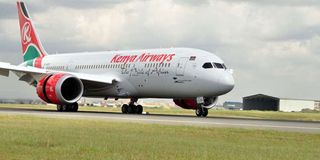What KQ- SAA partnership means to Tanzania

A KQ Dreamliner aircraft. FILE PHOTO | NMG
What you need to know:
- Merger of airlines is not a new phenomenon and this can be evidenced by the-then merger between SAA and ATCL years ago which, however, did not work.
Dar es Salaam. The move by Kenya Airways (KQ) and South African Airways (SAA) to establish an African airline in 2023, offers both opportunities and challenges to budding regional air operators like Air Tanzania Company Limited (ATCL), analysts say.
On Wednesday, during an official visit by Kenya’s President Uhuru Kenyatta to South Africa, KQ and SAA signed a Strategic Partnership Framework which will see to the two carriers eventually form a pan-African carrier.
Analysts who spoke to The Citizen yesterday said the move means that Tanzania needs to watch and see what finally comes out of the agreement.
“If it works, then Tanzania should consider emulating it by also looking at who to partner with. It could be Ethiopian Airlines, or any other formidable player,” said the Tanzania Air Operators Association (Taoa) executive secretary, Ms Lathifa Sykes.
Noting that the aviation industry is a very difficult industry, she said airlines and other stakeholders need to think outside the box for survival of the industry.
Taoa represents members who include locally-registered air operators, airport ground-handling companies and aircraft refuellers based in Tanzania Mainland and Zanzibar.
ATCL managing director Ladislaus Matindi said the merger was a good business arrangement because it would spice up competition.
However, Mr Matindi said they would take the wait-and-see approach before making a decision on what could be a good business arrangement for them to take up.
Merger of airlines is not a new phenomenon and this can be evidenced by the-then merger between SAA and ATCL years ago which, however, did not work.
The ATCL-SAA merger became insolvent in 2006 after accumulating losses amounting to Sh24.7 billion in the four years of the merger.
“We are watching closely. We are here to stay - and that is why we are establishing ourselves,” he asserted.
Precision Air CEO Patrick Mwanri said Africa is a prime market for the aviation industry.
“The potential is so huge, and for a very long time we have left foreign carriers to benefit from this, while we are busy operating solo. I take this move by SAA and KQ as just the beginning of many alliances to come, and this has been the agenda for Africa under SAATAM (Single African Air Transport Market). As East Africa’s leading carriers Ethiopian Airlines and KQ grapple with financial and politically-instigated crises, regional carriers like ATCL, Uganda Airlines and RwandAir have laid plans “to eat the big boys’ lunch!”
An aviation expert with about 47 years of experience, John Njawa, said Tanzania needs to re-engineer its strategies to ensure whatever had engineered the collabo between the two airlines could also be seriously evaluated - and then decide how to best handle the situation
He said the planned KQ-SAA merger could be translated into synergising their individual capabilities.
This, Mr Njawa added, could benefit them through a wider market accessibility, connectivity and more flexibility for passengers in meeting their intended objectives. There will be wider coverage, as well as flexibilities to African, Asian, European and the Americas destinations.
“They can easily become airlines of choice, if the services can measure up to passengers’ desires and expectations,” noted Mr Njawa.
“Aviation and airlines is a tough industry. A lot of variables can derail your measures/processes if your calculations don’t work out fine for you.”
Another aviation expert and trainer with nearly four decades of experience, Mr Juma Fimbo, said the planned merger could be a business strategy against the increasing market competition in the region.
If his assumptions were right, then ATCL would choose to either compete for its survival - or not to, he said.
“The competition will be stiff,” noted Mr Fimbo. However, he said, if the merger would be sustainable, it is likely to improve services - and bring down fares in the region.
Aviation expert Jimray Nangawe said merger of the two airlines would pose a stiff competition for ATCL.
This, he said, calls for ATCL to think of cooperating with other airlines to capitalise on the regional market. “Business is all about bringing synergies together. We need to cooperate as we compete,” he said.
Once Africa’s second-largest airline after Ethiopian Airlines, SAA had survived for decades on government bailouts and was shedding routes even before the Covid-19 pandemic struck.
Until September this year, the airline’s fleet was down to six planes, from a previous 46.



